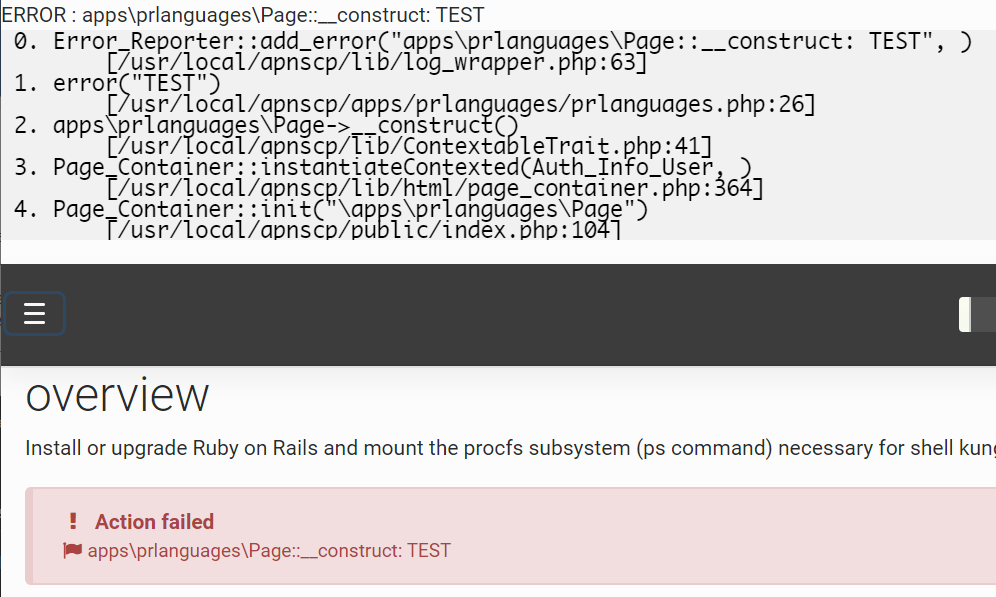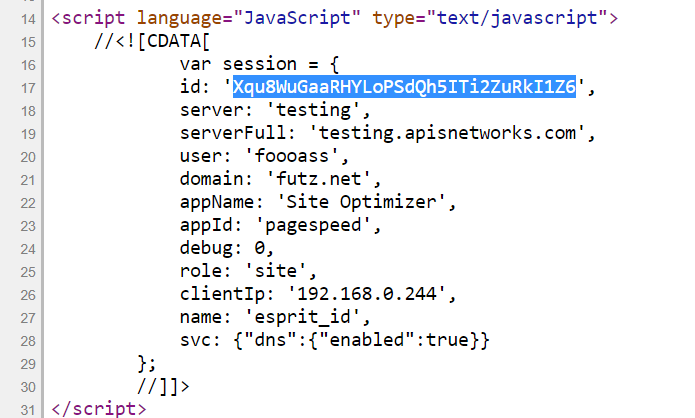# Debugging
ApisCP may emit debugging information when debug mode is enabled. You can enable debugging on a per-request basis, or globally using cp.debug Scope. Backtraces (code pathways) can be enabled by setting [core] => debug_backtrace_qualifier. Backtraces give context around how an error occurred, making them invaluable for debugging.
cpcmd scope:set cp.debug true enables debugging mode globally.
cpcmd scope:set cp.config core debug_backtrace_qualifier -1 enables backtraces for all reporting classes (fatal, error, warning. info, deprecated, and debug) as well as exceptions. Increasing verbosity levels inherit lower levels. Backtraces are mandatory when reporting issues.
The following table is only relevant when panel debugging is enabled.
| Level | Features |
|---|---|
| 0 | Disabled, no backtraces |
| 1 | Errors - error() |
| 2 | Warnings - warn() |
| 3 | Informative remarks - info() |
| 4 | Deprecated - deprecated_fn(), deprecated() |
| -1 | All above classes + debug() |

env DEBUG=1 cpcmd common:whoami executes the whoami (opens new window) method in common module. This method simply returns the current username. A special module test (opens new window) is available in debug mode to facilitate development. Only this request operates in debug mode ensuring appropriate isolation in a production environment.
# env DEBUG=1 cpcmd test:benchmark common_whoami
benchmark common_whoami
time: 0.01 sec (1000 rounds; 0.0051 ms each; 195429.32 per second)
0.0051169395446777
# env DEBUG=0 cpcmd test:benchmark common_whoami
ERROR : test_benchmark: command does not exist
----------------------------------------
MESSAGE SUMMARY
Reporter level: ERROR
----------------------------------------
ERROR: test_benchmark: command does not exist
When in debug mode, housekeeping and cron services are disabled as well as job runner. Housekeeping/cron tasks may not be invoked traditionally. Job runner invocation is covered under Jobs.
Verbosity may be selectively controlled via env VERBOSE=n cpcmd where n is a corresponding level in the table above. Verbosity cannot be selectively changed in the frontend. Set [core] => debug_backtrace_qualifier then target sessions for debug mode below.
# Targeted frontend debug
misc:debug-session(string $id, bool $mode = true) enables debugging for a frontend session (DAV, UI, SOAP). Session identifier may be retrieved from a browser session by accessing the session.id property. session.debug encodes whether debug mode is enabled.
# Enable debugging for active session Xqu...I1Z6 in browser
env DEBUG=1 cpcmd misc:debug-session Xqu8WuGaaRHYLoPSdQh5ITi2ZuRkI1Z6
# Disable debugging when you're done
env DEBUG=1 cpcmd misc:debug-session Xqu8WuGaaRHYLoPSdQh5ITi2ZuRkI1Z6 false
session.id may be retrieved from a JavaScript console (opens new window), cookie source ("esprit_id" de facto cookie name) or from the source.

TIP
Other morsels of information: name is the cookie name, role the authenticated role in the set [site, user, admin]. appId represents the current app whose structure corresponds to /apps/APPID.
Any unhandled exceptions will be converted from a placeholder page to the actual stack trace. Appending ?FULL_STACK to the page request dumps the entire stack, which may be several thousand lines. By default, full stack dumps are disabled in lieu of abbreviated stringified traces.
# Log locations
ApisCP logs messages in a few places. Respective services use their preferred logging locations. This table summarizes common services and their log locations.
All locations are within /var/log unless noted. siteXX is shorthand for /home/virtual/siteXX/fst/. siteXX is the site ID identifier that can be resolved using get_site_id domain.com. "..." following siteXX is short-hand for /var/log thus siteXX ... log indicates /home/virtual/siteXX/fst/var/log/log. CP_ROOT is the panel home, typically either /usr/local/apnscp or /usr/local/apiscp. Words fully capitalized are symbolic.
| Service | Location | Remarks |
|---|---|---|
| Apache | httpd/error_log | HTTP startup |
| Apache per-site | siteXX ... httpd/error_log | Per-site error logs, FPM connectivity |
| PHP-FPM | siteXX ... php-fpm/POOL | Per-site PHP errors, notices |
| HTTP malware | httpd/modsec_audit.log | See malware scans |
| ClamAV | messages | Only available on scanner |
| Mail (all excl. auth) | maillog | SMTP prefixed "postfix". IMAP/POP3 "dovecot". Local delivery "maildrop". Excludes authentication. |
| Mail auth | secure | Rejections from invalid passwords via PAM |
| FTP | vsftpd.log | |
| MySQL | /var/lib/mysql/mysqld.log | |
| PostgreSQL | /var/lib/pgsql/X/data/log/ | Circular buffer by day-of-week. X is version major, 11, 10, etc. |
| SSH | secure | SSH login attempts, successes |
| crond | cron | Periodic services via Dev > Task Scheduler and /etc/cron.d |
| fail2ban (Rampart) | fail2ban.log | "Found" is log match. "Unban" automatic expiry. |
| ApisCP frontend | CP_ROOT/storage/logs/error_log | Same logging as Apache |
| ApisCP frontend | CP_ROOT/storage/logs/php-fpm.log | PHP errors generated in UI |
| ApisCP backend | CP_ROOT/storage/logs/start.log | Errors originating from backend |
| Passenger (launcher) | /.socket/passenger/logs | Launcher issues for Python, Ruby, and Node apps |
| Passenger (app) | APPROOT/log | Per-application messages. APPROOT is one directory down from document root. |
# Automated email reporting
ApisCP can be configured to forward a copy of unhandled errors (PHP notices/errors and exceptions) to an email address. Set [core] => bug_report in config.ini. This should be used by developers only, as it generates false positives that are encountered during typical operation.
cpcmd scope:set cp.config core bug_report email+bugs@domain.com
Given the volume generated, plus-address notation or a separate email address is recommended to facilitate mail filtering by your SMTP provider.
# Backend
You can start the backend broker from the command-line in the foreground. It handles elevation requests from the frontend via the query() function in the API.
To enable debugging, run:
systemctl stop apiscp
cd /usr/local/apnscp/bin
env DEBUG=1 ./apnscpd -f restart
When debugging is active, the following tasks are disabled: cron, housekeeping, jobs. Setting [cron] => no_debug to false allows backend tasks to resume as normal; however, this state is unstable for production environments.
# PHP-FPM status
FPM pools are grouped by site ID identifier and name. By default, one pool is created named after the primary domain. php:pools() lists active pools for a site.
php:pool-status(string $pool = '') provides the internal PHP-FPM pool status as reported by systemd's notify feature. These values are real-time metrics as seen by the pool manager.
php:pool-info(string $pool = '') reports service information from systemd. This command is equivalent to systemctl show POOLNAME. StatusText is the plaintext value of php:pool-status.
# Jobs
Laravel Horizon is used for jobs unless has_low_memory is enabled (via Bootstrapping or [cron] => low_memory is set in config.ini). Horizon can be manually launched using:
./artisan horizon
misc:get-job-queue() reports the pending work queue. Pending jobs may be processed using ./artisan queue:work. An optional flag, --once, processes these jobs singularly.
# Disable job runner, housekeeping, and cron to prevent jobs from starting
cpcmd scope:set cp.debug true
systemctl restart apiscp
# Validate the queue is empty
cpcmd misc:get-job-queue
# Jobify a command
cpcmd misc:jobify 'common_whoami'
# Validate the queue has 1 job
cpcmd misc:get-job-queue
# Run first job in queue, enable verbose output
./artisan queue:work --once -vvv
# Validate queue is now empty
cpcmd misc:get-job-queue
Jobs are unavailable when the panel is in debug mode unless Horizon has been manually started.
# Web App installation
Web Apps engaged through the UI are dispatched to a job runner, and may also be installed using API commands. Each app maps to a module named after itself, and follows a common interface:
NAME:install(string $hostname, string $path = '', array $options = [])
| Web App | Module |
|---|---|
| Discourse | discourse |
| Drupal | drupal |
| Ghost | ghost |
| Joomla! | joomla |
| Laravel | laravel |
| Magento | magento |
| NextCloud | nextcloud |
| WordPress | wordpress |
Applications support both generalized options and specific options. The following are common options found in Web > Web Apps:
| Name | Type | Remarks |
|---|---|---|
| version | string | Version number |
| ssl | bool | Enable SSL |
| user | string | Optional username of |
| autoupdate | bool | Enable automatic updates |
Jobs are unavailable when the panel is in debug mode unless Horizon has been manually started.
# Command listing
misc:list-commands(string $filter = '') is a role-aware helper that displays available commands. Used in conjunction with cpcmd, it provides a convenient interface to filter available commands.
# Show commands available to Appliance Administrator ("admin" username)
cpcmd misc:list-commands
# Show commands available to site1 Site Administrator
cpcmd -d site1 misc:list-commands
# Show commands available to site1 in the "ghost" module
cpcmd -d site1 misc:list-commands 'ghost:*'
# "l" is an alias and equivalent to the above command
cpcmd -d site1 misc:l 'ghost:*'
# Introspection
misc:command-info(string $filter = '') provides verbose information about the command, including its method signature and documentation. This can be used to explain what parameters an API command anticipates. Method usage is similar to list-commands:
# Show signature for ghost:install as Site Administrator
cpcmd -d site1 misc:command-info ghost:install
# Show command signature for all commands in "admin" module
cpcmd misc:command-info 'admin:*'
# "i" is an alias and equivalent ot the above command
cpcmd misc:i 'admin:*'
# User preferences
Preferences are stored in siteXX/info/USER. common:load-preferences() is a convenient interface to show these preferences.
common:get-user-preferences(string $user) allows for a Site Administrator access to a user's preferences.
YAML_INLINE is an environment variable that controls array folding depth. Increasing folding depth improves readability. The default value is 2.
# Show Appliance Administrator's preferences
cpcmd common:load-preferences
# Show preferences for site1's Site Administrator
cpcmd -d site1 common:load-preferences
# Show preferences for user "foobar" on site1
cpcmd -d site1 -u foobar common:load-preferences
# The following command is equivalent
cpcmd -d site1 common:get-user-preferences foobar
# Use YAML_INLINE=n to expand collapsed fields
env YAML_INLINE=4 cpcmd -d site1 common:load-preferences
common:purge-preferences() will purge the active user's preferences. This may be useful to gauge API interaction or to reset a role to a clean state. purge-preferences may only be invoked in debug mode.
# Get current user preferences
cpcmd common:load-preferences
# Purge all preferences
env DEBUG=1 cpcmd common:purge-preferences
# Preferences for active role is now empty
cpcmd common:load-preferences
# Connecting to Redis
Redis manages caching and job queues over a UNIX domain socket. Database 1 is assigned to ApisCP, 2 to jobs, and 3 to rspamd (if utilized), with a decreasing priority assigned to each. Do not issue the FLUSHALL command as this will purge rspamd logical replication from PostgreSQL.
redis-cli -s /usr/local/apnscp/storage/run/redis.sock
# Show memory usage
info memory
# Show stored keys
keys *
# API bypasses
You may bypass API permissions by using a surrogate module. This allows for rapid prototyping of individual API methods which may otherwise be restricted. Surrogates are covered in detail in PROGRAMMING.md.
<?php declare(strict_types=1);
class Dns_Module_Surrogate extends Dns_Module {
public function __construct() {
parent::__construct();
// ensure we always win permissions
$this->exportedFunctions = ['*' => PRIVILEGE_ALL];
}
public function t() {
return $this->_cron();
}
}
You can now interact with the _cron method from the command-line instead of being restricted by API accessibility rules.
env DEBUG=1 cpcmd dns:t
Be careful with this approach. All cross-module calls inherit the current role. This means that you may try calling an API method intended for PRIVILEGE_SITE, as PRIVILEGE_ADMIN. Unless permissions are overwritten with a surrogate, cross-module violations are still blocked.
